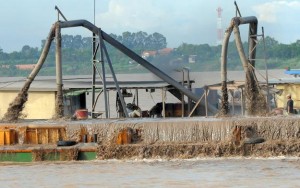There are several impacts that land reclamation has had on coastal ecosystems:
1. Disruption of the food chain/web
Sediments in the water do not allow plants like the phytoplankton to survive as sunlight is unable to penetrate the cloudy water surface. Phytoplankton is the base of the aquatic food chain/web. A decrease in the amount of phytoplankton means a decrease in the amount of food for the organisms down the chain and web. Similarly, the loss of coral reefs, a source of shelter for many aquatic animals like the damselfish, threatens the survival of these reef organisms.
An example of a food chain amongst aquatic organisms
Image taken from: http://www.odec.ca/projects/2007/thom7h2/foodchain.htm
2. Decrease in quality of water
Land reclamation also changes the quality of the surrounding areas of water. Material used causes the water to be more acidic, and certain organisms are unable to adapt to this environment. Sediments also do not allow sunlight to pass through, cause many aquatic plants to be unable to photosynthesize. This upsets the oxygen-carbon dioxide levels in the water, making it harder for organisms to survive. Additionally, the loss of mangrove forests, whose roots help trap sediments and other impurities, would mean that there is a loss of a natural filter to help keep our waters impurity-free.
Landfills cause water to be murky and cloudy
Image taken from: http://www.foreignpolicy.com/articles/2010/08/04/the_sand_smugglers
3. Loss of coastal ecosystems
The most important, and undeniably the most grave, impact land reclamation has is the loss of ecosystems. When these ecosystems are destroyed, there is no retrieving them back. There is only a limited number of existing organisms and wildlife in which we have. Clearing over 90% of mangroves that previously existed on our land in order to build new residential areas would mean that we have lost 90% of mangrove forests that we can never get back.


